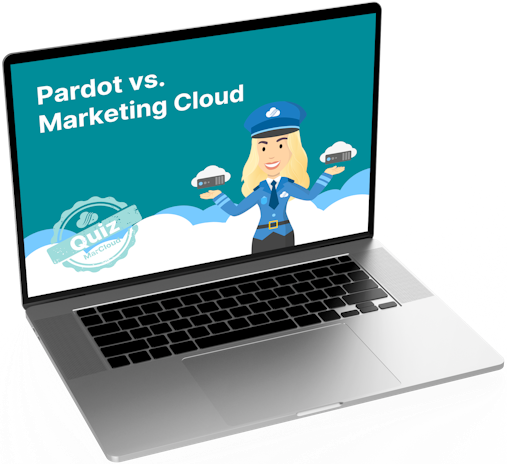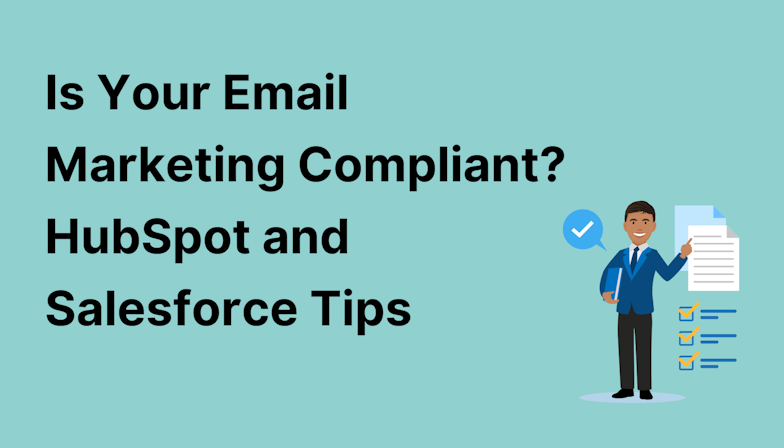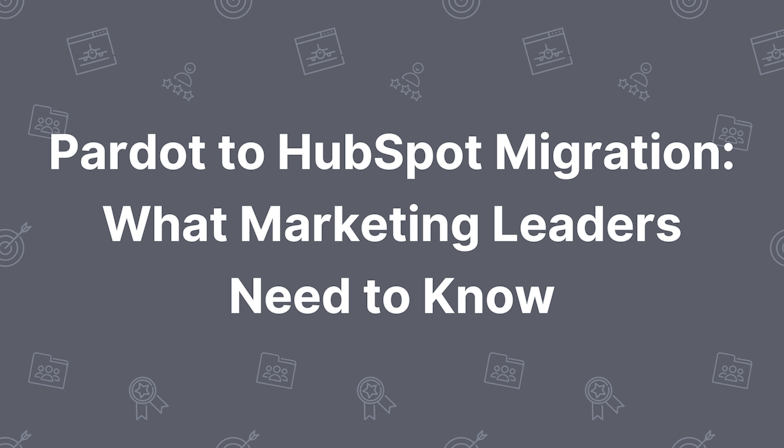Pardot and Salesforce Marketing Cloud have a lot in common. Both are marketing automation and digital analytics platforms, and both are owned by Salesforce. In 2022, Salesforce confused the world by renaming Pardot to ‘Marketing Cloud Account Engagement‘ and Salesforce Marketing Cloud to ‘Marketing Cloud Engagement', adding a whole new layer of confusion for newcomers to the ecosystem.
This had some in the community questioning, is Pardot becoming Marketing Cloud?
Despite the renaming, as it stands, Pardot aka ‘Account Engagement', is still very much its own product, as is ‘Marketing Cloud Engagement'.
Simply put, Salesforce now offers a single solution for digital marketing automation called ‘Marketing Cloud‘, and both Account Engagement and Marketing Cloud Engagement are available to purchase as individual products within this solution.
Other products in the Marketing Cloud solution include ‘Data Cloud for Marketing', ‘Personalisation', and ‘Intelligence'.
Still with me? Good.
Now, for the purposes of this blog post, I'm going to use the old name ‘Pardot' rather than Account Engagement, because users are still very much searching for it online. Just know that Pardot and Account Engagement are the same thing.
Let's dive into which is right for your business.
When you compare the features of Pardot with the features of Marketing Cloud Engagement, you’ll see a lot of the same functionality: email automation, lead nurture journey mapping, social media marketing, CRM integration, and so on. This can lead you to think, ‘Are Pardot and Marketing Cloud Engagement the same thing?'. The reality is, these two platforms are quite different.
TLDR. To help you quickly grasp the key differences between Pardot (now Marketing Cloud Account Engagement) and Marketing Cloud Engagement, here’s a very simple breakdown:
Pardot is designed for B2B marketing with longer sales cycles, focusing on lead nurturing and sales alignment.
Marketing Cloud Engagement suits B2C marketing where real-time, multichannel communication is critical.
Pardot integrates tightly with Salesforce CRM and supports email marketing, scoring, grading, and automation rules.
Marketing Cloud Engagement is better for advanced, high-volume journeys involving SMS, push, social, and advertising.
Of course, it's not quite as simplistic as that, so read on for a more detailed comparison.
Pardot vs Marketing Cloud: The major differences
In a nutshell, these are the main differences:
Pardot is often positioned as a B2B platform, while Marketing Cloud Engagement is more B2C (although this isn’t always the case!).
The main difference is the buying cycle. Businesses with high sales value products or services and a more complex sales journey, for example, involving multiple decision makers, tend to find Pardot the better platform. While businesses with large databases of prospects yet lower sales values tend to do better with Marketing Cloud Engagement.
Pardot is primarily an email marketing and nurture platform, whereas Marketing Cloud Engagement has other functions like Advertising and Mobile Studio.
Pardot enables greater marketing and sales alignment for teams thanks to its seamless integration with Sales Cloud.
Marketing Cloud Engagement is great for 1:1 customer journey communications with mixed marketing channels.
As the two do not directly compete in terms of their ideal audience, one is not necessarily better than the other. Their use cases and price points are noticeably different.
Nevertheless, here's what to consider when choosing between Pardot vs Marketing Cloud…
Free Salesforce Marketing Tools Quiz
Answer a handful of questions and receive our recommendation on the Salesforce marketing platform that could be best suited to your business.
- Find your best marketing tool
- Online quiz
- Quick & easy questions
- Immediate result

B2B vs B2C - The common differentiation
I mentioned that Pardot is the clear B2B marketing automation solution, while Marketing Cloud Engagement is for B2C companies.
This is somewhat true, as Pardot is positioned well for B2B marketing specifically and, therefore, its strengths lie in the areas of marketing and sales alignment, lead management, and automated actions, as well as marketing campaigns.
Marketing Cloud Engagement, on the other hand, offers greater capabilities when it comes to social media marketing and advertising, plus SMS campaigns. Naturally, these types of activities tend to be a bigger focus for B2C brands who communicate one-to-one via social or using transactional mobile messaging.
However, no rule says B2C companies cannot benefit from Pardot as their chosen marketing automation platform, and likewise, B2B companies with Marketing Cloud Engagement.
Depending on your business, the digital channels you use for marketing, the size of your database, and what you need to achieve with your automation software, either could be appropriate - or both! Some companies use Marketing Cloud and Pardot together, tapping into all the features.
Marketing Cloud Engagement - mobile messaging & social
Marketing Cloud Engagement includes a range of different modules. Each module focuses on one particular area of digital marketing and used together, allows for truly cross-channel marketing.
For example, you have Email Studio for sending batch and scheduled emails, MobileConnect for sending SMS campaigns, Social Studio for advanced social media marketing, Advertising for running ad campaigns to your database, and Journey Builder for setting up a 1:1 customer journey across multiple communication channels, plus others.
In my opinion, Social Studio and MobileConnect set it aside from Pardot quite clearly, as these are very obviously built to enable marketers who regularly communicate on these channels, and with the ability to pre-schedule and automate social and mobile activity made very easy.
With Pardot, you won’t find as much focus on social media marketing (although a ‘Social' feature does exist), or channels like SMS and digital advertising.
Another benefit of Marketing Cloud Engagement is its ability to process large amounts of complex data, with fantastic segmentation potential when you have the right data science and development support. Experts in Marketing Cloud Engagement can use SQL, AMPscript, and other programming languages to manage databases and integrate with third-party platforms.
Pardot - ideal for lead management & nurture
If you have a long sales cycle, you usually close business via a sales team (as opposed to on your website or in-store), or you have a high-value product or service and a modest database of prospective customers, Pardot is likely to be your preferred automation solution. The same applies to account-based marketing approaches.
This is because the functionality of Pardot allows for excellent lead nurture.
Whilst it has email automation in the same way Marketing Cloud Engagement does, Pardot has a more advanced ability to easily create drip marketing campaigns that are highly personalised, using website behaviour and interactions as the triggers. It's ideal for proactive nurture that coaxes prospects through the customer journey.
Pardot also features sophisticated automation for assigning leads to users of the platform, based on intelligent lead grading and scoring. What’s more, you can set up automated notifications when leads are active on-site, a functionality you won’t find in Marketing Cloud Engagement.
Beyond nurturing leads, Pardot makes it simple to pass information about leads to the sales team, including their digital behaviour such as website and content engagements, so those closing sales have the context they need to tailor conversations and proposals effectively. In short, Pardot enables sales teams as well as marketers.
Side-by-side comparison: Pardot vs Marketing Cloud
|
Feature |
Pardot (Account Engagement) |
Marketing Cloud Engagement |
|---|---|---|
|
Best for |
B2B marketing |
B2C marketing |
|
Sales cycle |
Longer, considered purchases |
Shorter, transactional purchases |
|
CRM integration |
Native Salesforce CRM integration |
Salesforce CRM integration (via connectors) |
|
Channels supported |
Primarily email |
Email, SMS, push, social, advertising |
|
Automation tools |
Engagement Studio, automation rules |
Journey Builder, Interaction Studio |
|
Lead management |
Scoring, grading, lifecycle stages |
Audience segmentation, real-time triggers |
|
Typical Users |
Marketing & sales teams |
Marketing teams focused on customer journeys |
|
Licensing |
Per prospect database size |
Per contact volume + features used |
Which is best for your business?
Use case
Marketing Cloud Engagement makes for the best choice if your business needs a platform to more easily engage with large volumes of customers across multiple channels, assisting in their customer journey. Those in the retail or FMCG industries are likely to see great benefits in the features of Marketing Cloud Engagement.
Pardot is the right option if your sales process requires long-term nurture and you need to bridge the gap between your sales and marketing teams. Those with products of high sales value or with long sales cycles will benefit most from Pardot.
Both platforms integrate with Sales Cloud, although the process of linking Marketing Cloud Engagement is much more complex than Pardot, which is fully out-of-the-box.
Price
Of course, a major consideration when comparing both platforms is price. If you feel as though both Pardot and Marketing Cloud Engagement could work for your business, budget may be the deciding factor because Marketing Cloud Engagement can typically come with a higher overall cost. The payment structure is based on the edition you need plus a cost for the modules you need access to. Think of it like subscriptions to each module that can be added or removed as needed.
Pardot, on the other hand, is priced by edition, with some add-ons available at an additional cost to the lower tiers. Both platforms come with some usage restrictions that can also affect cost.
As both Account Engagement and Marketing Cloud Engagement consultants, we are hands-on with both platforms every day. If you need support with implementing or using either, get in touch.

Tom Ryan
Founder & CEO of MarCloud, Tom has been on both sides of the fence, client-side and agency, working with Salesforce platforms for the best part of a decade. He's a Salesforce Marketing Champion and certified consultant who loves to co-host webinars and pen original guides and articles. A regular contributor to online business and marketing publications, he's passionate about marketing automation and, along with the team, is rapidly making MarCloud the go-to place for Marketing Cloud and Salesforce expertise. He unapologetically uses the terms Pardot, Account Engagement and MCAE interchangeably.
More by Tom RyanFeatured resource

Quiz: Pardot vs. Marketing Cloud
Answer a handful of questions and receive our recommendation on the Salesforce marketing platform that could be best suited to your business; Account Engagement, Marketing Cloud Engagement, or a mix of both. Get your result immediately then contact us to validate or discuss it.
Take the quiz
